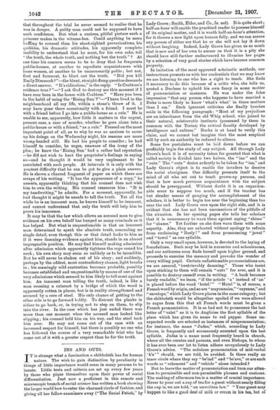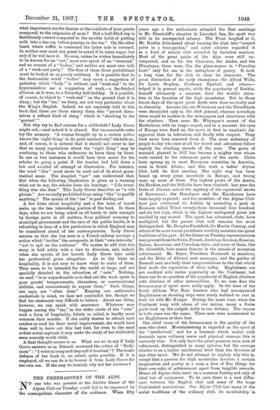INS AND OUTS.
JT is strange what a fascination a shibboleth has for human nature. The wish to gain distinction by peculiarity in things of little importance would seem in many persons to be innate. Little tests and criteria are set up every few years by those who pique themselves upon their power of social differentiation. Just now a proficient in this remote and microscopic branch of social science has written a book showing the larger world bow to enter the charmed circle of fashion, and giving all her fellow-examiners away (" The Social Fetich," by
Lady Grove ; Smith, Elder, and Co., Ss. net). It is quite short ; half-an-hour will enable the practised reader to possess himself of its original matter, and it is worth half-an-hour's attention, for it throws a new light upon human folly, and we can assure any person of either sex that he or she will not lay it down without laughing. Indeed, Lady Grove has given us so mach that is new and of her own to amuse us that it is a pity she should have still further endeavoured to illumine her pages by a selection of very good stories which have become common property, .
In imitation of the most approved scholastic methods, our instructress presents us with her credentials that we may know we are listening to one who has a right to teach. She finds it necessary to do this because of a critic who, she tells us, quoted a Duchess to uphold his own fancy in some matter of pronunciation or manners. He was under the false impression "that any person who happens to have married a Duke is more likely to know ' what's what' in these matters than I am." Such ignorant criticism she finally brushes aside in the following paragraph : "Most of my prejudices are an inheritance from the old Whig school, who joined to their natural, aristocratic instincts (possessed by them in common with the Tories) the critical faculty developed by intelligence and culture." Burke is at hand to verify this claim, and we cannot but imagine that the most sceptical will by such an authority be reduced to silence.
Some few postulates must be laid down before we can profitably begin the study of any subject. All through Lady Grove's book it is of necessity taken for granted that what is called society is divided into two halves, the " ins " and the " outs." The "outs " desire ardently to be taken for "ins," and Lady Grove's object is to enable the invaders to deceive the social aborigines. One difficulty presents itself to the mind of all who set out to teach grown-up persons, and that is how much previous acquaintance with the subject should be presupposed. Without doubt it is an unpardon- able error to suppose too much, and if the teacher has but slender means of gauging the accomplishment of the scholars, it is better to begin too near the beginning than too near the end. Lady Grove errs upon the right side, and it is evident that she has not been unconscious of the pitfalls of the situation. In her opening pages she tells her scholars that it is unnecessary to warn them against saying " shime " for "shame." Yet further on she does warn them with some asperity. Also, they are exhorted without apology to refrain from exclaiming " Reely I " and from pronouncing "jewel " and " towel " as one syllable.
Only a very small space, however, is devoted to the laying of foundations. Such may be laid in nurseries and schoolrooms, and our authoress soon finds herself upon higher ground, and proceeds to exercise the memory and provoke the wonder of every willing pupil. Certain unfashionable pronunciations are, we are assured, "irretrievably damning." Those who insist upon sticking to them will remain " outs " for ever, and it is possible to destroy oneself even in writing. "A book becomes barely readable," we learn, " if the article ' a' instead of ` an' is placed before the word ' hotel." " Hotel " is, of course, a French word by origin, and so are "mayonnaise," "cayenne," and " envelope," which Lady Grove places in the same category; but the shibboleth would be altogether spoiled if we were allowed to argue from this that all French words must be given a French pronunciation. It is as bad not to pronounce the last letter of "valet" as it is to Anglicise the first syllable of the place which has given its name to red pepper. Some un- expected words are selected as instances of mispronunciation; for instance, the name " Judas," which, according to Lady Grove, is frequently and erroneously accented upon the last syllable. Judas is a name most frequently heard in church, where all the curates and parsons, and even Bishops, to whom it has ever been our lot to listen adhere scrupulously to Lady Grove's advice. " The sedulous pronunciation of mid-verbal h's " should, we are told, be avoided. Is there really an inner circle where they say " be'ind" and " be'ave," or are such words as "vehement" and "vehicle " alone intended ?
But to leave the matter of pronunciation and turn our atten- tion to permissible and non-permissible phrases and customs. The making of afternoon tea is a matter of crucial importance. Never to pour out a cup of tea for a guest without nearly filling the cup is, we are told, " an unwritten law." " Your guest may happen to like a good deal of milk or cream in his tea, but of
what importance are the fancies or the Coffiforts of your guests Compared to the exigencies of caste P But a half-filled cup is fastidiously correct compared to the terrible habit of putting milk into a tea-cup before pouring in the tea." On the other hand, where coffee is concerned the latter rule is reversed. In neither case must any guest be asked if he takes sugar, but only if he will have it. No man, unless he wishes immediately to be known for an "out," must ever speak of an "overcoat," and no woman of a " bodice," and neither sex must ever talk of a " week-end party." The first of these three prohibitions 'must be looked on as purely arbitrary. It is possible that to the fashionable world "bodice" may carry a suggestion of pedantry which " body " is without, and " week-end" to the hypersensitive ear a suggestion of work,—a far-fetched allusion, as it were, to a Saturday half-holiday. It is possible, of course, to object to " week-end " on the ground that it is slang ; but the " ins," we fancy, are not very particular about the King's English. Indeed, we are expressly told in this book that there are those among them who "permit them- selves a refined kind of slang" which' is "shocking to the genteel.' "
' Bub why try to find reasons for a shibboleth ? Lady Grove might ask,—and indeed it is absurd. But unreasonable rules try the memory. "A woman brought up in a certain milieu knows the 'right thing' to do quite instinctively," she tells us ; and, of course, it is natural that it should not occur to her that so many regulations about the "right thing" may be confusing to those who endeavour to learn them by heart. In one or two instances it would have been easier for the scholar to grasp a point if the teacher had laid down a law and avoided all attempt at illustration. For instance, the word " like " must never be used out of its strict gram- matical sense. The simplest "out" can understand that. But when the following illustration is given as a warning what not to say, the scholar loses his bearings : "Like every- thing else she does." This Lady Grove describes as "a vile phrase." Are we really prohibited from using " like " to qualify anything ? The syntax of the " ins " is past finding out.
A few hints about hospitality and a few tales of travel make up the less interesting portion of the book. In these days, when we are being asked on all hands to take example by foreign parts in all matters, from political economy to municipal government and the care of the public health, it is refreshing to hear of a few particulars in which England may be considered ahead of her contemporaries. Lady Grove assures us that she has seen in a French railway carriage a notice which " invites " the occupants, in their "own interests," " not to spit on the cushions." We hasten to add that this story is told solely with a view to diversion, and, indeed, when she speaks of her travels Lady Grove lays aside her professorial gown altogether. As to the hints on hospitality, it is not easy to know what to make of them. They seem to be intended for the world at large, and not specially directed to the education of " outs." Nothing, we read, " is so unpardonable as to find out the weak spots in your guests' temperaments, characters, or conversational abilities, and remorselessly to expose them." Such things, she says, are " often done." Keeping our authoress's eredentials in mind, we dare not contradict her, though we find her statement very difficult to believe. About one thing, however, we can speak with assurance. Whatever may happen among the "ins," in the wider circle of the "outs" such a form of hospitality, falsely so called, is hardly more common than murder. If she really desires to attract such readers as read for their social improvement, she would have done well to leave out this last hint, for even to the most ardent social aspirant it may make the study of her shibboleth seem scarcely worth while. A final thought occurs to us. What are we to say if Lady Grove answers us as Disraeli answered the critics of " Endy- mion" : "I write in irony and they call it bombast " ? The ironic defence of her book is, we admit, quite possible. If it is employed, all we can do is to borrow it from Lady Grove for our own use. If she may be ironical, why not her reviewer ?















































 Previous page
Previous page